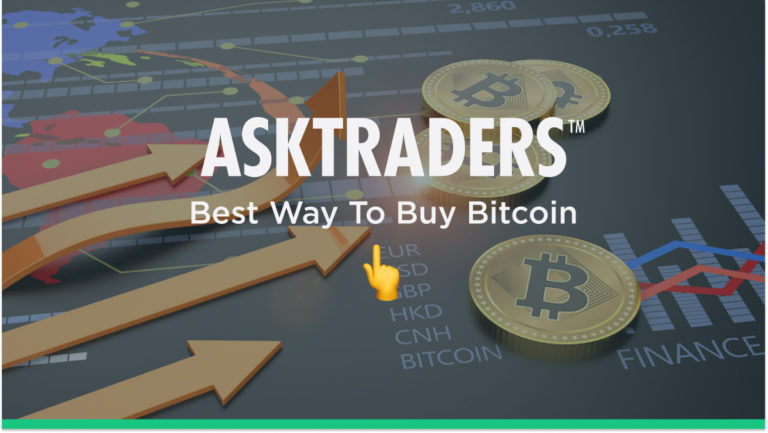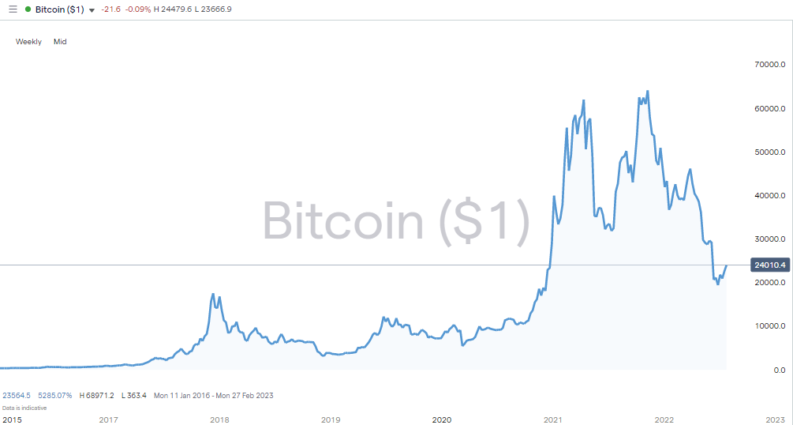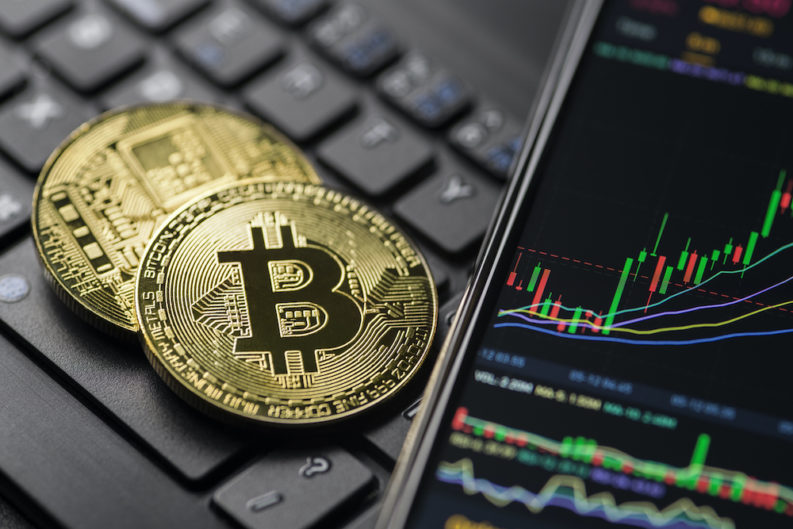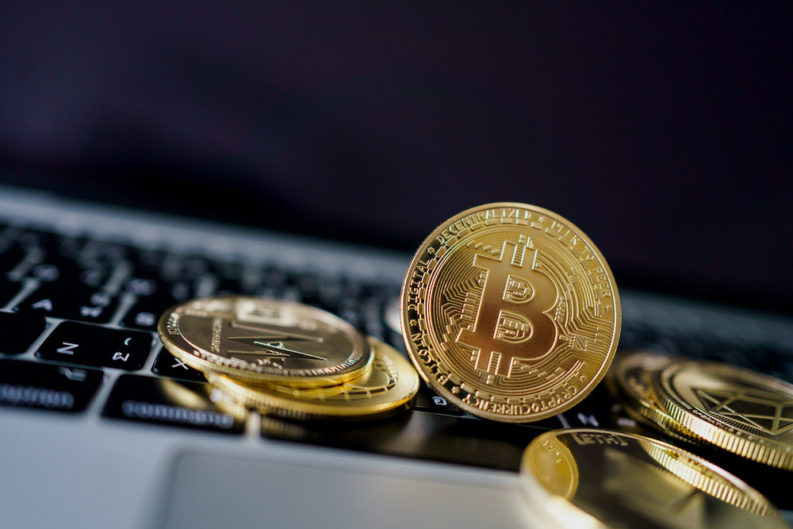
However, some of the peculiarities of the market do raise the question – what is the best way to buy Bitcoin? There are, in fact, various different ways to buy BTC, and this article will consider ease of use, trading costs and security of account to establish which is the best-fit.
- How to buy Bitcoin safely
- How to buy Bitcoin easily
- What are the costs associated with buying Bitcoin?
- Final thoughts
HOW TO BUY BITCOIN SAFELY
Any financial transaction is associated with risk. If you are buying Bitcoin, then there is the risk that it will subsequently go down in price. This is ‘market risk’. Another risk related to protecting your assets is ‘counterparty risk’, and managing this risk is crucial.
A surprise price move against you is part of the deal. Trading cryptos is a high risk-return operation. Losing all your money to a scam is another thing.
The crypto sector has unfortunately picked up a reputation as being full of scammers. Those who have found their account cleared out by unscrupulous agents will know a particularly deep pain.
Flipping it around means that those looking to buy Bitcoin might be more willing to consider some straightforward ways of protecting themselves.
There are three main routes to buying Bitcoin. These are best broken down as exchanges and intermediaries and online brokers.

Source: IG
Not all brokers are regulated. Not all regulated brokers are licensed by the same authority. However, with a little research, you can find a broker with a fully functioning platform and competitive pricing regulated by a Tier-1 authority.
If you are looking to buy Bitcoin, are UK-based, and are new to trading, then it’s worth looking for a broker that is regulated by the Financial Conduct Authority (FCA).
The regulatory cover is a function of the instruments you trade and your domicile. Equities listed on stock exchanges are regulated instruments, so assuming your domicile doesn’t discount you, and your broker is regulated, then your trading will come under the protective rules and regulations of a financial authority.
Cryptocurrencies are unregulated instruments, that means that even if you’re a UK citizen who is signed up with an FCA-regulated broker your trading in bitcoin and other digital currencies will not come under the protective umbrella of the FCA.
The kind of regulatory protection that will apply to equity trades is detailed below.
- Negative balance protection– you can’t lose more than your initial stake.
- Segregated client funds– your cash and the broker’s cash are held separately. If the broker goes bust, then your funds are in a protected account at another bank.
- Financial Services Compensation Scheme (FSCS)– the UK’s statutory deposit insurance and investors’ compensation scheme for customers of authorised financial services firms. This means that the FSCS can pay compensation up to £85,000 if a firm cannot do so.
Other Tier-1 regulators offer similar protection. The exact details depend on which regulator your trading comes under, but good rubber stamps to look for include those of the Australian Securities and Investments Commission (ASIC) and the Cyprus Securities and Exchange Commission (CySEC).
If you go down this route into buying Bitcoin, then names to potentially consider include ATFX, eToro, IG and, Pepperstone, which are all regulated by Tier-1 authorities.
Most online broker platforms allow clients to trade a variety of instruments from the same account. That means that if you hold positions in stocks and crypto at eToro then it could well be the case that the equity element of your portfolio is protected, but the crypto part not.
The knock-on effect of this is that some of the regulatory protocols associated with the equity part of the platform, whilst not applying directly to the crypto part, do ‘rub off’ onto the digital trading. An FCA-regulated broker will, for example, have to provide evidence that it is a legitimate going concern with sufficient capital to support its operations. That ‘capital requirement’ element of FCA authorisation alone is a big deal for brokers who have to tie-up cash to ensure they stay in business.
Is buying Bitcoin using an exchange safe?
Exchanges set up to trade crypto are now well-established. One of the biggest is Coinbase, which has a strong position in the trading community and has been in operation since 2012. If you are looking for an alternative to Coinbase, then there are plenty of other new entrant exchanges in the market, each with its own take on why it offers the best kind of service.
The decentralised protocols and revolutionary approach of Bitcoin exchanges are also backed up by a degree of anonymity. Blockchain technology's paradox is that enough account information is shared to ensure that the system works, but identities are protected.
While exchanges may not be regulated as such, they do have strong reputations. It’s a grey area, but if anonymity appeals, and buying crypto is partly driven by anti-establishment sentiment, then using an exchange might be for you.

HOW TO BUY BITCOIN EASILY
If you’re looking to buy Bitcoin, you have to set up some kind of account to facilitate the exchange of your funds for the crypto. This will then become the place you hold your Bitcoin position.
The split between exchanges and brokers continues through into the question of the way that they allow clients to trade and hold crypto.
Onboarding
Both exchanges and brokers will require you to register with them and go through KYC (Know Your Client) procedures. If you’re going to be holding an asset with them, they do, after all, need to be able to verify your identity.
Being regulated means that brokers are required to ask for more information. Uploading a piece of photo ID is a standard procedure and they are also required to ask questions about your personal circumstances so they can build an investor profile for you. There aren’t necessarily any right or wrong answers, the process helps the broker comply with duty of care protocols, even though you are looking to trade unregulated instruments.
It will come down to your personal preference regarding whether you find this reassuring or an inconvenience.
Exchanges act as an intermediary that holds both seller’s and buyer’s funds and processes a transaction once all terms are met. Any reputable exchange will require you to complete onboarding with it, but it is typically a more streamlined process than a broker.
One factor that tips the balance in favour of brokers for most people is the type of account that has to be set up. Broker accounts are multi-asset, it’s possible to trade instruments such as shares, commodities, bonds, ETFs, options and forex as well as crypto, all on the same platform. Exchanges are unregulated, so only offer crypto markets. There is also a need to consider special ‘wallets’ and there is a need to research the pros and cons of hot and cold crypto wallets.
Functionality
The functionality of both CFD brokers and exchanges can be state of the art. Of course, there are some that won’t be entirely up to standard, but in general, the competition between the firms means that they have all developed exceptionally user-friendly platforms.
To seek to trade more actively, you might want to use a review such as those listed here to find the best fit for you personally.
Most brokers offer free demo accounts where you can practice trading using virtual funds. This is a risk-free way to understand better how to buy Bitcoin and the pros and cons of different brokers.

WHAT ARE THE COSTS ASSOCIATED WITH BUYING BITCOIN?
If you’re looking for the best way to buy Bitcoin in the UK, then safety and ease are factors to consider – but profits are what it’s all about, so costs also have to be considered.
Before you step into the market, do consider your investment aims. Everything else being equal, you might look to use brokers to run short-term trading strategies and exchanges for longer-term, buy-and-hold style investments.
Most brokers willingly share details of their costs. If they don’t, then it’s possibly a sign to steer clear of them as they may be trying to hide charges from you.
A breakdown of the fees to keep in mind is laid out below. Establishing what you are likely to pay in charges protects your capital and helps you develop trading strategy ideas.
- Bid/offer spread – an unavoidable part of trading. This is the difference between the buying and selling price in the Bitcoin market. The wider the spread, the greater the effective cost of that purchase of BTC. If you are buying at $18,000 and the offer price is $18,200, then you will effectively incur a $200 charge on that trade.
- Trade commissions – some brokers charge a commission on executed trades. These can be fixed costs or variable and on top of the bid-offer spread.
- Fund transfer fees– look out for charges associated with wiring funds into an account. These may be levied by a third party rather than the broker/exchange, but they all count.
- Forex conversion costs – when buying Bitcoin, UK-based individuals are likely to use GBP. If your broker or exchange account is USD-denominated, then there will be a cost associated with converting from GBP to USD and back again when you withdraw funds.
- Fund withdrawal fees – these can be a sting in the tail and are something to check out before you commit to any broker or exchange.
- Financing charges – the costs associated with holding a position in your account. These accrue daily and are more of a factor if you are trading using leverage and using a CFD broker.
- Inactivity fees – charges for holding an account and not actively trading on it. These can kick in as early as three months in. They usually apply even if you hold a position.
- Account management fees– some platforms charge a fee for holding an account with them.
When trying to find the best broker, you need to factor in the costs associated with the different platforms. No one likes to see unnecessary charges eat into their profits.
It is, however, important to not be ‘penny wise and pound foolish’. Costs are part of the deal, and it’s a case of finding the best way to buy Bitcoin without overpaying for the privilege.
FINAL THOUGHTS
The huge range of brokers and exchanges on offer can at first appear daunting, especially as exchanges and brokers offer a different kind of service. Using a little common sense and approaching the subject with safety as a priority is a great way to start. If security of funds is your priority, then these brokers that have been reviewed by AskTraders analysts would be the best place to start the process of shortlisting which platform to use.
It’s then time to embrace the process of considering your investment aims and establishing what kind of strategy you want to run. This is all part of the learning process and will help you get off to the best start when you finally take the next steps to buy Bitcoin.




